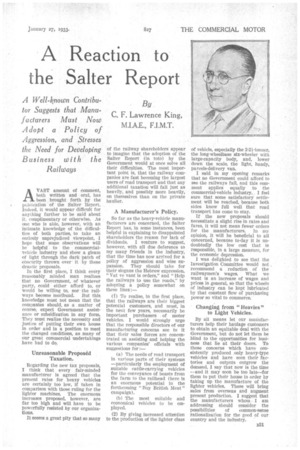A Reaction to the Salter Report
Page 45

If you've noticed an error in this article please click here to report it so we can fix it.
A Well-known Contributor Suggests that Manufacturers Must Now Adopt a Policy of Aggression, and Stresses the Need for Developing Business with the Railways By
C. F. Lawrence King, M.I.A.E., F.I.M.T.
AVAST amount of comment, both written and oral, has been brought forth 11:137 the publication of the Salter Report. Indeed, it would appear difficult for anything further to be said about it, complimentary or otherwise. As one who is able, however, with an intimate knowledge of the difficulties of both parties, to take an entirely unprejudiced viewpoint, I hope that some observations will be helpful to the commercialvehicle industry and show a gleam of light through the dark patch of obscurity thrown over it by these drastic proposals.
In the first place, I think every reasonably minded man realizes that no Government, of whatever party, could either afford to, or would be willing to, see the railways become moribund. But this knowledge must not mean that the companies should, as a matter of course, expect Government assistance or subsidization in any form. They must realize the necessity and justice of putting their own house in order and in a position to meet the changed conditions, as many of our great commercial undertakings have had to do.
Unreasonable Proposdd Taxation.
Regarding the new tax proposals, I think that every fair-minded manufacturer is agreed that the present rates for heavy vehicles are certainly too low, if taken in comparison with those ruling for the lighter machines. The enormous increases proposed, however, are far too high and will have to be powerfully resisted by our organizations.
It seems a great pity that so many of the railway shareholders appear to imagine that the adoption of the Salter Report (in toto) by the Government would at once solve all their difficulties. The most important point is, that the railway companies are fast becoming the largest users of road transport and that any additional taxation will fall just as heavily, and possibly more heavily, on themselves than on the private haulier.
A Manufacturer's Policy.
So far as the heavy-vehicle manufacturers are concerned, the Salter Report has, in some instances, been helpful in explaining to disappointed shareholders the reason for lack of dividends. I venture to suggest, however, with all due deference to my many friends in the industry, that the time has now arrived for a policy of aggression and wise expansion. They should take for their slogans the Hebrew expression, "Vat ye vent is orders," and "Help the railways to use the roads," by adopting a policy somewhat on these lines :— (t) To realise, in the first place, that the railways are their biggest potential customers, and must, in the next few years, necessarily be important purchasers of motor vehicles. I would strongly urge that the responsible directors of our manufacturing concerns see to it that their sales forces are concentrated on assisting and helping the various companies' officials with suggestions for : (a) The needs of road transport in various parts of their systems —particularly the employment of suitable cattle-carrying vehicles for the conveyance of beasts from the farm to the railhead (here is an enormous potential in the forthcoming "Buy British Meat" campaign).
(b) The most suitable and economical vehicles to be employed.
(2) By giving increased attention to the production of the lighter class of vehicle, especially the 2-21-tonner, the long-wheelbase six-wheeler with large-capacity body, and, lower down the scale, the light, handy, parcels-delivery van.
I said in my opening remarks that no Government could afford to see the railways fail, and this comment applies equally to the commercial-vehicle industry. I feel sure that some satisfactory settlement will be reached, because both sides know full well that road transport has come to stay.
If the new proposals should necessitate a slight rise in rates and fares, it will not mean fewer orders for the manufacturers. In my opinion, it will be beneficial to all concerned, because to-day it is undoubtedly the low cost that is responsible, in a large measure, for the economic depression.
I was delighted to see that the Investigation Committee would not recommend a reduction of the railwaymen's wages. What we want is an increase of wages and prices in general, so that the wheels of industry can be kept lubricated by that constant flow of purchasing power so vital to commerce.
Changing from "Heavies" to Light Vehicles.
By all means let our manufacturers help their haulage customers to obtain an equitable deal with the Government, but do not let them be blind to the opportunities for business that lie at their doors. To those concerns which have consistently produced only heavy-type vehicles and have seen their factories and outputs outgrow the demand, I say that now is the time —and it may soon be too late—for them to put their house in order by taking up the manufacture of the lighter vehicles. These will bring sales from overseas and augment present production. I suggest that the manufacturers whom I am addressing should consider the possibilities of common-sense rationalization for the good of our country and the industry.




























































































